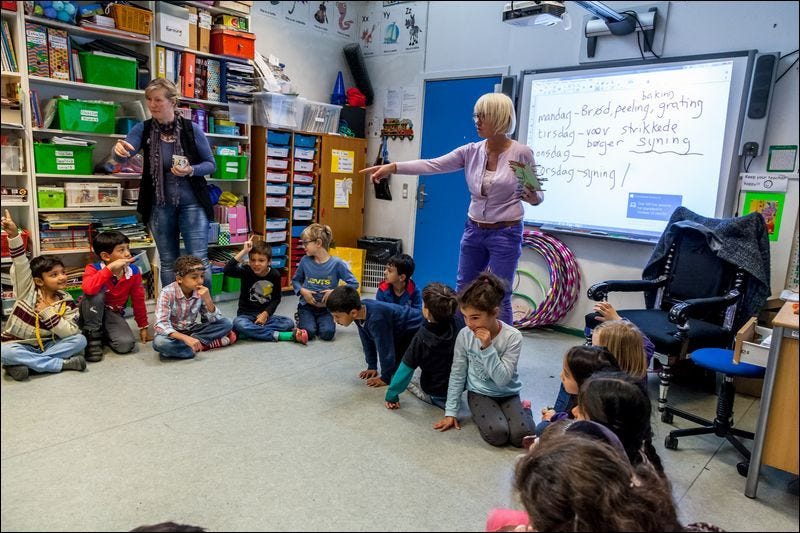This past week, I attended a class in an international school here in Copenhagen called Bjørn’s International School. Over there, I witnessed students in a single class get dynamically regroup based on their understanding of a subject and not on their age.
Basically, when the English class started, the teacher moved the students around the class into small workgroups of different English levels and then set each group with a separate exercise — although all under the theme of the letter “R”. The class was unified by the theme but each individual’s learning was not encumbered by some random biological allotment such as age.
It was beautiful and fantastic. The kids really enjoyed it, and I spotted them helping each other out in times of difficult with the exercises several times. In my rage against the machine approach to education, due to my own personal bias of a highly structured and standards-obsessed school, I had forgotten that these kinds of places actually exist.
Up until v0.6 of my project journey, I had a claim in there that the “educational systems have failed us”. It was a harsh blanket statement that was rendered null after my experience at this school and an encounter with my advisor who told me that her child — who is attending primary school in Denmark — was also really enjoying her school time.
My understanding of how much policy and culture is messing up education in different places such as Abu Dhabi and Montreal, the two cities I’ve lived in previously, was severely underestimated. There are of course design and technology solutions out there that can help, but these are dwarfed by how much has to be communicated to parents and governments about the benefits of having smaller classrooms, time for children to play and explore, and the danger of standardized testing.
Last week, I came up with two radical ideas for schools that were extremely technologically heavy. While I think that certain elements of them have merits, their scope and my ability to prototype even a piece of them was unrealistic for a project that is barely 7 weeks long. In addition, even if those systems were flawless, it’ll take years to convince anyone of their value outside of the world of private schools, and from where I’m sitting it seems to me that many private schools have sort of figured it out — we just have to hope that the parents are putting their children in those places.
Where does this leave me for the coming week of research?

Well I’m still interested by what I believe is at the core of “education”: good sources of information, the ability to learn in the context of a situation that is relevant, a good mix of autonomy and socialization, the ability to produce and share ideas and consequently discuss them, and personalized feedback with the ability to either implement the feedback or to simply accept that failure is a part of the process — and a giant part of it at that.
I’ve had all these ingredients boiling in a giant thinking pot all weekend and so far there’s little sign of their potential to make a flavourful broth.
If it’s possible to contribute in any way to information acquisition or to the sharing of ideas, by being both relevant and inspiring to someone, then the project has succeeded in being “EdTech”. That is what I am striving for.
This is a progress update entry in my 7 week final thesis project at CIID. You can read all the other entries here.

